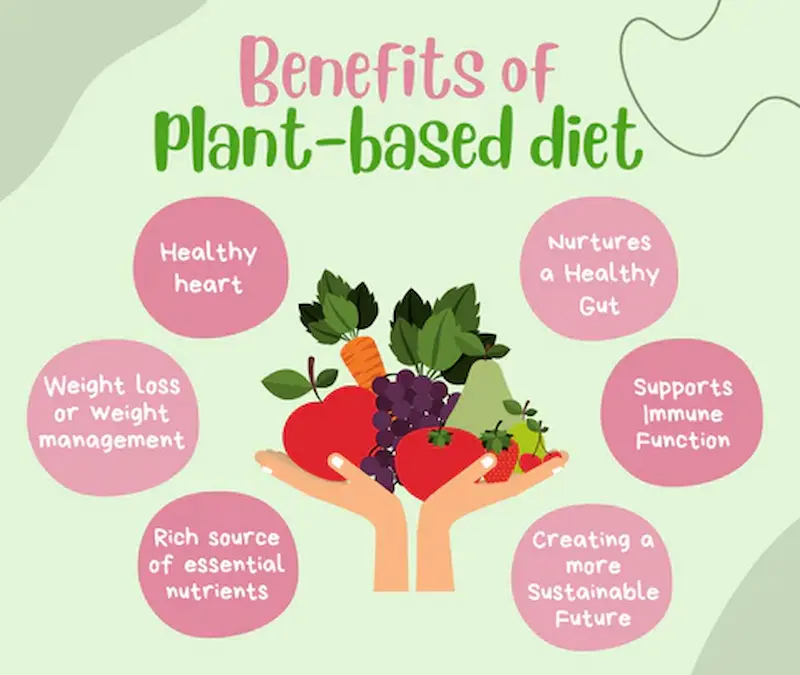In recent years, how plant-based foods are changing diets has become a significant topic in nutrition, health, and lifestyle discussions. What was once considered a niche or alternative approach to eating has now entered mainstream consciousness. Plant-based foods are no longer just a trend—they are transforming the way people think about what goes on their plates, how their food affects their health, and the impact of their dietary choices on the environment.
From flexitarians who eat mostly plants to full-time vegans who eliminate all animal products, millions of people worldwide are adjusting their eating habits to include more plant-based meals. But what is driving this shift, and why are plant-based foods reshaping diets across the globe? Let’s dive deeper.
What Are Plant-Based Foods?

Plant-based foods are primarily derived from plants, including vegetables, fruits, legumes, grains, nuts, seeds, and other minimally processed plant ingredients. Unlike strict vegetarian or vegan diets, plant-based eating emphasizes whole, nutrient-dense foods and may occasionally include small amounts of animal products. The main goal is to make plants the centerpiece of meals rather than meat or highly processed foods.
Examples of popular plant-based foods include:
- Legumes: Beans, lentils, chickpeas, and peas are rich in protein, fiber, and essential minerals, making them a staple for plant-based meals.
- Whole grains: Quinoa, brown rice, oats, barley, and millet provide sustained energy, complex carbohydrates, and key nutrients like magnesium and iron.
- Vegetables & fruits: Leafy greens (spinach, kale), cruciferous vegetables (broccoli, cauliflower), berries, citrus fruits, and root vegetables offer vitamins, antioxidants, and phytonutrients that support long-term health.
- Nuts & seeds: Almonds, walnuts, chia seeds, flaxseeds, and sunflower seeds are excellent sources of healthy fats, protein, and minerals.
- Plant-based protein alternatives: Tofu, tempeh, seitan, and modern plant-based meat substitutes mimic the taste and texture of animal protein while offering nutritional benefits.
These foods are highly versatile, allowing for creative meal planning and incorporation into nearly any cuisine, from Mediterranean and Asian to Latin American dishes.
Health Benefits of Plant-Based Foods

Adopting a plant-based diet provides numerous scientifically backed health benefits. Here’s how they contribute to better overall well-being:
1. Heart Health
Plant-based diets are naturally low in saturated fats and cholesterol. Diets rich in leafy greens, legumes, and whole grains help lower blood pressure, reduce LDL cholesterol, and decrease the risk of heart disease. Regular consumption of foods like lentils, beans, and quinoa supports cardiovascular health.
2. Weight Management
Plant-based meals are typically lower in calories and higher in fiber than meat-heavy diets. Fiber promotes satiety, helps regulate appetite, and reduces overeating. This makes plant-based diets effective for maintaining or achieving a healthy weight.
3. Diabetes Prevention
High-fiber foods like whole grains, beans, and vegetables stabilize blood sugar levels and improve insulin sensitivity. Research indicates that plant-based diets can reduce the risk of type 2 diabetes and improve blood sugar control in people already diagnosed with diabetes.
4. Digestive Health
Fiber-rich plant foods support a healthy gut microbiome, aid digestion, and promote regular bowel movements. Foods like beans, lentils, whole grains, and fruits act as prebiotics, feeding beneficial gut bacteria and enhancing overall gut health.
5. Reduced Cancer Risk
Diets abundant in vegetables, fruits, and whole grains provide antioxidants, phytochemicals, and anti-inflammatory compounds that may lower the risk of certain cancers. Cruciferous vegetables, such as broccoli and cabbage, contain compounds that have been linked to cancer prevention.
6. Mental Health Benefits
Emerging research suggests that plant-based diets may also support mental well-being. Nutrient-dense foods like leafy greens, berries, and nuts provide vitamins, minerals, and antioxidants that promote brain health and may reduce the risk of depression and anxiety.
You may also like to read this:
Types of Hidden Ingredients In Processed Foods You Must Know
Why Calories on Labels Can Be Confusing Explained
Best Apps To Check Nutrition Facts For Healthy Eating
10 Top Nutrition Facts People Often Ignore To Eat Smarter
Top Insights on What Are the Latest Food Industry Trends
Environmental and Ethical Impact
Plant-based eating is not only beneficial for personal health but also for the planet and animal welfare.
Environmental Benefits:
- Animal agriculture is a leading contributor to greenhouse gas emissions, deforestation, and water usage.
- By prioritizing plant-based foods, individuals can significantly reduce their carbon footprint and help conserve natural resources.
Ethical Considerations:
- Many people adopt plant-based diets to align with ethical values related to animal welfare.
- Choosing plant-based alternatives minimizes reliance on industrial animal farming practices, which are often associated with poor conditions for livestock.
How Plant-Based Foods Are Changing Eating Habits
The rise of plant-based foods has led to significant shifts in eating habits and food culture worldwide:
1. Rise of Meat Alternatives
Products like Beyond Meat, Impossible Foods, and other plant-based proteins allow people to enjoy familiar flavors without consuming animal products. These products are increasingly used in restaurants, fast food, and home cooking.
2. Increase in Flexitarian Diets
Many people are choosing a “flexitarian” approach, where plant-based foods dominate their diet but small amounts of meat, dairy, or seafood are included occasionally. This flexible approach makes plant-based eating more accessible and sustainable for long-term adoption.
3. Creative Cooking
Plant-based eating encourages experimentation with new flavors, textures, and ingredients. From grain bowls and vegetable stir-fries to plant-based pizzas and desserts, home cooks and chefs are exploring a variety of culinary possibilities.
4. Shift in Food Products
Supermarkets, food delivery services, and restaurants now offer a wide range of plant-based options, including dairy-free cheeses, plant-based ice creams, frozen meals, and ready-to-eat plant-based snacks. This increased accessibility makes it easier than ever for people to incorporate plant-based foods into their daily routines.
Tips for Adopting a Plant-Based Diet
Adopting a plant-based diet can be simple if approached thoughtfully. Here are practical tips:
- Start Slowly: Introduce more vegetables, legumes, and whole grains gradually to your diet.
- Focus on Protein: Ensure meals contain plant-based proteins like beans, lentils, tofu, tempeh, and nuts.
- Experiment with Recipes: Try plant-based versions of your favorite meals to keep eating enjoyable and diverse.
- Plan Balanced Meals: Include foods rich in iron, calcium, vitamin B12, and omega-3 fatty acids. Consider fortified foods or supplements if necessary.
- Read Labels Carefully: Watch for added sugars, sodium, or unhealthy fats in processed plant-based products.
Emerging Trends in Plant-Based Eating
The plant-based movement continues to evolve, driven by innovation, technology, and changing consumer preferences. Here are some trends that show how plant-based foods are changing diets today and in the future:
1. Plant-Based Convenience Foods
Consumers are increasingly seeking convenience without compromising health. Ready-to-eat plant-based meals, frozen plant-based entrees, and meal kits are gaining popularity. These products make it easier for busy individuals to integrate plant-based options into their daily routines.
2. Plant-Based Dairy Alternatives
From oat milk and almond yogurt to cashew cheeses and soy-based creams, dairy alternatives are now mainstream. These products cater not only to vegans but also to those with lactose intolerance or a desire to reduce dairy consumption.
3. Functional Plant Foods
Functional foods provide additional health benefits beyond basic nutrition. Ingredients like turmeric, spirulina, moringa, matcha, and adaptogenic herbs are increasingly incorporated into plant-based meals, smoothies, and snacks to boost immunity, reduce inflammation, and support mental health.
4. Personalized Nutrition and Plant-Based Diets
Technology and data-driven approaches are enabling personalized plant-based diets. Apps and meal planning tools help people identify nutrient needs and create plant-focused diets tailored to their health goals, lifestyle, and preferences.
5. Plant-Based Dining Experiences
Restaurants worldwide are innovating with plant-forward menus. Fine dining, casual eateries, and fast-food chains are offering creative plant-based dishes that appeal to a broad audience, proving that plant-based eating can be flavorful and satisfying.
Common Challenges and How to Overcome Them
Transitioning to a plant-based diet is rewarding, but some people face challenges. Understanding these obstacles and how to overcome them can make the journey smoother:
1. Protein Concerns
Many worry about not getting enough protein on a plant-based diet. Including legumes, tofu, tempeh, seitan, nuts, seeds, and whole grains throughout the day ensures adequate protein intake.
2. Nutrient Gaps
Certain nutrients like vitamin B12, iron, calcium, and omega-3 fatty acids may require attention. Fortified foods, supplements, or targeted planning can help prevent deficiencies.
3. Accessibility and Cost
Depending on where you live, fresh plant-based foods or meat alternatives may be less accessible or more expensive. Planning meals around seasonal vegetables, beans, lentils, and whole grains can be cost-effective and nutritious.
4. Habitual Eating Patterns
Switching from meat-centered meals to plant-based options can be challenging due to ingrained habits. Gradual transition—like incorporating “Meatless Mondays” or starting with one plant-based meal per day—helps build sustainable habits.
Practical Meal Ideas for a Plant-Based Lifestyle
Here are some practical meal ideas to help you incorporate more plant-based foods into your daily routine:
- Breakfast: Overnight oats with chia seeds, almond milk, berries, and a drizzle of maple syrup.
- Lunch: Quinoa salad with roasted vegetables, chickpeas, pumpkin seeds, and a lemon-tahini dressing.
- Snack: Hummus with carrot and cucumber sticks or roasted spiced nuts.
- Dinner: Lentil and vegetable curry served with brown rice or whole-grain naan.
- Dessert: Coconut milk chia pudding with fresh fruit and a sprinkle of cacao nibs.
By rotating meals and experimenting with flavors, you can enjoy a nutrient-rich, satisfying, and exciting plant-based diet.
Looking Ahead: The Future of Plant-Based Diets
As awareness of health, sustainability, and animal welfare grows, plant-based foods are likely to continue shaping global diets. Innovations in food technology—such as lab-grown meats, new protein sources like algae and mushrooms, and functional plant-based ingredients—will expand options for consumers.
Moreover, educational campaigns, improved labeling, and increased availability of plant-based products will make it easier for individuals to adopt healthier, more sustainable diets. In the coming years, plant-based eating is expected to become a standard component of global nutrition rather than a niche movement.
Final Thoughts
Understanding how plant-based foods are changing diets underscores their transformative impact on personal health, the environment, and ethical eating practices. From improved cardiovascular health and weight management to reducing the ecological footprint of our meals, plant-based diets provide comprehensive benefits.
By embracing vegetables, legumes, grains, nuts, seeds, and innovative plant-based alternatives, anyone can create a balanced, nutrient-rich diet that aligns with modern health and sustainability goals. Whether you are a committed vegan, a flexitarian, or someone gradually exploring plant-based meals, these foods are reshaping the way we eat and paving the way for a healthier, more sustainable, and conscientious future.
FAQs
1. What does “plant-based” mean?
A plant-based diet focuses on foods primarily from plants, including vegetables, fruits, legumes, grains, nuts, and seeds. It emphasizes whole, minimally processed foods, and may include small amounts of animal products depending on personal preference.
2. Are plant-based diets healthy?
Yes. Research shows that plant-based diets can improve heart health, support weight management, regulate blood sugar, promote digestive health, and reduce the risk of chronic diseases like diabetes and certain cancers.
3. Do I get enough protein on a plant-based diet?
Absolutely. Plant-based proteins come from beans, lentils, chickpeas, tofu, tempeh, seitan, nuts, seeds, and whole grains. With a balanced diet, it’s possible to meet protein needs without animal products.
4. Can plant-based foods help with weight loss?
Yes. Plant-based diets are typically high in fiber and low in calories, which helps promote satiety and reduce overeating, making weight management easier.
5. How do plant-based diets impact the environment?
Plant-based diets reduce greenhouse gas emissions, conserve water, and prevent deforestation compared to diets high in animal products. Choosing more plant-based foods is a sustainable choice for the planet.




